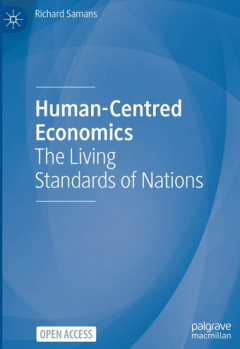Filter by

Alltägliche Lebenssituation sprachbeeinträchtigter Kinder; Ein Analyseverfa…
Buku ini membahas situasi kehidupan sehari-hari sebagai objek diagnostik bahasa pedagogis dan dapat ditempatkan dalam diskursus tentang diagnostik dan pengembangan kompetensi komunikasi-linguistik. Telah diteliti faktor-faktor apa saja yang berkontribusi pada konstruksi situasi kehidupan sehari-hari. Selain itu, sebuah prosedur analisis untuk diagnosis bahasa pedagogis telah dikembangkan, diuji…
- Edition
- -
- ISBN/ISSN
- 978-3-658-42148-9
- Collation
- online resource ( XVII, 271 Pages)
- Series Title
- -
- Call Number
- 371.9144 SCH a

Human-Centred Economics; The Living Standards of Nations
Buku akses terbuka ini mengkaji kinerja ekonomi yang kronis dalam hal inklusi, keberlanjutan, dan ketahanan. Ditemukan bahwa model pertumbuhan dan pembangunan ekonomi liberal standar telah berkembang selama satu abad terakhir dengan cara yang secara fundamental tidak seimbang yang kurang menekankan peran penting institusi – norma hukum, insentif kebijakan, dan kapasitas administrasi publik �…
- Edition
- -
- ISBN/ISSN
- 978-3-031-37435-7
- Collation
- online resource ( XXIX, 356 Pages)
- Series Title
- -
- Call Number
- 338.9 SAM h

Towards Sustainable and Resilient Tourism Futures; Insights from the Internat…
Buku ini dapat diakses secara terbuka. "Daya saing produk pariwisata dan tujuan wisata sangat bergantung pada sumber daya alam dan sosial. Pada saat yang sama, jejak lingkungan industri pariwisata dan kontribusinya terhadap ketidaksetaraan sosial tidak dapat disangkal. Transformasi menuju masa depan pariwisata yang lebih berkelanjutan diperlukan untuk memastikan kontribusi positif dalam memenuh…
- Edition
- -
- ISBN/ISSN
- 978-3-503-21195-1
- Collation
- online resource ( 252 Pages)
- Series Title
- Serangkaian publikasi Institut Riset Pariwisata Jerman
- Call Number
- 338.4721 KOC t

Resilienz als Erfolgsfaktor im Tourismus; Beiträge aus Wissenschaft und Prax…
Ini adalah buku akses terbuka. Resiliensi saat ini merupakan salah satu tema masa depan yang utama dalam pariwisata. Dalam kondisi krisis yang berkepanjangan dan proses perubahan yang cepat, pertanyaan tentang daya tahan dan kemampuan beradaptasi semakin menjadi fokus utama. Apa yang menjadi ciri khas destinasi dan pelaku pariwisata yang lebih tangguh serta bagaimana transformasi yang diperluka…
- Edition
- -
- ISBN/ISSN
- 978-3-503-21260-6
- Collation
- online resource ( Pages)
- Series Title
- Serangkaian publikasi Institut Riset Pariwisata Jerman
- Call Number
- 338.4721 EIL r

People or Property; Legal Contradictions, Climate Resettlement, and the View …
Buku akses terbuka ini mengeksplorasi persimpangan hukum properti, relokasi, dan proses pemindahan penduduk di Amerika Serikat dan di antara komunitas yang bergumul dengan migrasi sebagai strategi adaptasi. Saat komunitas menghadapi prospek relokasi karena naiknya permukaan laut, para pembuat kebijakan, spesialis bencana, dan pemimpin komunitas berusaha memahami jalur adaptasi apa yang secara h…
- Edition
- -
- ISBN/ISSN
- 978-3-031-36872-1
- Collation
- online resource ( XXI, 242 Pages)
- Series Title
- -
- Call Number
- 344.046 JER p

Software Business; 14th International Conference, ICSOB 2023, Lahti, Finland,…
Buku akses terbuka ini merupakan prosiding yang telah direferensikan dari Konferensi Internasional ke-23 tentang Bisnis Perangkat Lunak, ICSOB (International Conference on Software Business) 2023, yang diselenggarakan di Lahti, Finlandia, dari tanggal 27–29 November 2023. Tema khusus dari ICSOB (International Conference on Software Business) 2023 adalah Agilitas Digital: Menguasai Perubahan d…
- Edition
- -
- ISBN/ISSN
- 978-3-031-53227-6
- Collation
- online resource ( XVIII, 514 Pages)
- Series Title
- Catatan Kuliah dalam Pemrosesan Informasi Bisnis
- Call Number
- 338.47 HYR s

Defending Checks and Balances in EU Member States; Taking Stock of Europe’s…
Buku akses terbuka ini membahas tindakan Pasal 7 TEU (Treaty on European Union), proses pengadilan, sanksi keuangan, dan Kerangka Aturan Hukum Uni Eropa untuk melindungi nilai-nilai UE dengan fokus khusus pada pemeriksaan dan keseimbangan di Negara Anggota Uni Eropa. Ini menganalisis standar substansif, kekuasaan, prosedur serta konsekuensi dan implikasi dari berbagai instrumen. Ini menggabungk…
- Edition
- -
- ISBN/ISSN
- 978-3-662-62317-6
- Collation
- online resource ( X, 480 Pages)
- Series Title
- Kontribusi terhadap hukum publik luar negeri dan hukum internasional
- Call Number
- 341.2422 BOG d

Remedies against Immunity?. Reconciling International and Domestic Law after …
Buku akses terbuka ini memeriksa konsekuensi dari Putusan Mahkamah Konstitusi Italia 238/2014 yang menolak kekebalan Republik Jerman dari yurisdiksi sipil atas klaim reparasi untuk kejahatan Nazi yang dilakukan selama Perang Dunia II. Keputusan bersejarah ini menciptakan serangkaian masalah hukum dan kontroversi yang saat ini belum terpecahkan dan terus membebani hubungan politik dan diplomatik…
- Edition
- -
- ISBN/ISSN
- 978-3-662-62304-6
- Collation
- online resource ( XXVI, 425 Pages)
- Series Title
- Kontribusi terhadap hukum publik luar negeri dan hukum internasional
- Call Number
- 341.26 VOL r

Studies in Global Animal Law
Buku akses terbuka ini berisi 13 kontribusi tentang hukum hewan global, yang didahului oleh sebuah pengantar yang menjelaskan konsep dan metode kunci. Hukum Hewan Global mengacu pada jumlah aturan dan prinsip hukum (baik yang dibuat oleh negara maupun yang tidak) yang mengatur interaksi antara manusia dan hewan lainnya, di tingkat domestik, lokal, regional, dan internasional. Hukum hewan global…
- Edition
- -
- ISBN/ISSN
- 978-3-662-60756-5
- Collation
- online resource ( VIII, 183 Pages)
- Series Title
- Kontribusi terhadap hukum publik luar negeri dan hukum internasional
- Call Number
- 345.049 PET s

Richter über internationale Gerichte?.; Die Rolle innerstaatlicher Gerichte …
Buku akses terbuka ini menyelidiki, dengan mengambil contoh dari Pengadilan Eropa untuk Hak Asasi Manusia (EGMR) dan Pengadilan Hak Asasi Manusia Inter-Amerika (IAGMR), peran yang dimainkan oleh pengadilan domestik dalam pelaksanaan keputusan internasional. Kapan mereka bersedia mendukung rekan mereka di Strasbourg atau San José dalam pelaksanaan keputusan mereka dan sekaligus 'menerapkannya' …
- Edition
- -
- ISBN/ISSN
- 978-3-662-61176-0
- Collation
- online resource ( Pages)
- Series Title
- Kontribusi terhadap hukum publik luar negeri dan hukum internasional
- Call Number
- 341.026 KUN r
 Computer Science, Information & General Works
Computer Science, Information & General Works  Philosophy & Psychology
Philosophy & Psychology  Religion
Religion  Social Sciences
Social Sciences  Language
Language  Pure Science
Pure Science  Applied Sciences
Applied Sciences  Art & Recreation
Art & Recreation  Literature
Literature  History & Geography
History & Geography